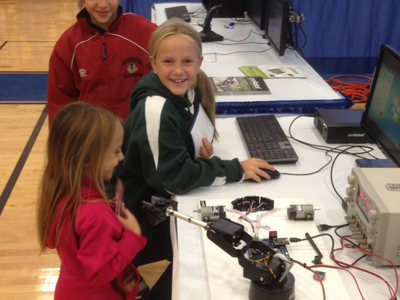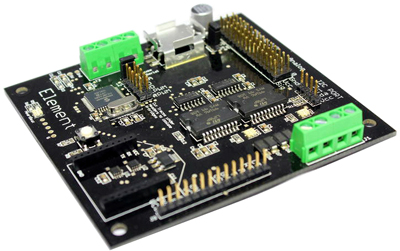Robotics and STEM education can be deployed as part of other school curricula, and not just science. As an example, there are programs in which teachers are using robotics in art and history classes.
Guy Cefalu | GEN2 Robotics
Tell us about GEN2 Robotics and why you started the company.
It all goes back to 1981, when as a young man, I found myself on a TWA Jumbo-Jet crossing the Atlantic and moving to the US from Europe. Needless to say, I was sad because I was leaving my childhood friends behind. Yet, I was excited because I was moving to a country in which people like Bill Gates or Steve Jobs, could get out of bed one morning and decide to create devices that could change the world. I was excited indeed.
Later on, I joined the school system while my mind was a cauldron of effervescent eagerness, never idling, ever curious. But quickly I became bored and inattentive. The party was over for me.
While in High School, I remember sitting in a history class, listening to the professor talk about the battle of Cartagena 209 BC, and how Scipio sailed from Rome to Spain to organize his army during the winter. While I find these topics extremely interesting now, back then my mind kept wondering, how do I build a robot? As a result, I failed my history class.
So here we are three decades later, in a world where technology will drive the future, and where technology can be used to keep students, engaged and excited.
As a result, and with the belief in the value that "STEM Through Robotics Education" can offer to our educational system, GEN2 ROBOTICS was born.
Like many businesses, it started with a dream, with a vision, and the guts to make a go of it. And that's just what I did in 2013, when I launched GEN2 ROBOTICS.
GEN2 ROBOTICS, designs and markets high quality research and development robots for the educational, and STEM markets world-wide. Our educational products focus on "STEM through Robotics Education", and provide opportunities for; authentic problem solving and contextualization of math and science.
In addition, our products are fun, engaging, and build a foundation for innovation in the 21st century.
You are dedicated to bringing robotics and drone technology to schools, Computer Science programs, and STEM education programs. Why is this so important?
In one simple sentence, STEM education creates critical thinkers, increases science literacy, and enables the next generation of innovators.
While this is true, International test scores tell us that in science U.S. eighth-graders were outperformed by eighth-grade students in Singapore, Chinese Taipei, Republic of Korea, Hong Kong SAR, Estonia, Japan, Hungary, and Netherlands.
We no longer manufacture, shoes, coats, TVs, radios, or phones. As a matter of fact, we no longer manufacture hardly anything. Dell computers are manufactured in China, and so are iPhones. Most cars are made in Japan and Korea., while high technology US jobs fly overseas due to a shortage of US engineers and scientists.
As a result, a new generation of innovators is what the US needs for the 21st century. Innovation creates new markets for new companies and new jobs.
President Barack Obama has stated that we need to increase student achievement in mathematics and science and expand STEM education and career opportunities. In a speech at the National Academies of Science last April, Obama said, “Reaffirming and strengthening America’s role as the world’s engine of scientific discovery and technological innovation is essential to meeting the challenges of this century. That’s why I am committed to making the improvement of STEM education over the next decade a national priority.”
Often, entrepreneurs show spontaneous creativity and a willingness to make decisions in the absence of solid data, but in this case, I believe that the data and business case are rock-solid.

How do you think that robotics and drone technology can help our school system?
Exciting new initiatives like STEM are using robotics both to motivate students and to serve as the primary programming platform for "Computer Science Curricula" in the 21st century. Robots are fun and keep students engaged, but most important, while building a robot you get to learn about; physics, electricity, mathematics, mechanics, and programming.
I believe that drones are the perfect tool for extending our students curiosity outside of the classroom, and into the real world while having lots of fun.
I see the change in my children constantly, as they see me work on this project and help me test and build prototypes of our products. My oldest daughter Kristen has gone from average to A+ in science and that is now her favorite school subject. My middle child Sophia has gone from being an iPhone addict to start her own business designing and marketing bows and other crafts at age 11. My youngest who is 4 ½ years old will not leave my side while testing automated GPS navigation on a new drone we are testing. It is awesome!
How does the United States currently compare with other countries as far as teaching and having robotics available in schools?
Let me start by saying that I love the US and that I am immensely grateful for all the opportunities this country has given me and my family. Having said that, I also have to recognize that something is wrong. International test scores tell us that in science U.S. eighth-graders were outperformed by eighth-grade students in Singapore, Chinese Taipei, Republic of Korea, Hong Kong SAR, Estonia, Japan, Hungary, and Netherlands. The ratio of dollars spent in the US on robotics and science programs in our schools is 3:1 against us I believe, thus the test scores.
Given recent budget cuts and other program cuts here in the US over the last few years how do you propose school districts afford to bring robotics into the classroom?
Here is how;
Educational robots don’t have to be expensive. Robots can be manufactured with a $20 Arduino controller, and another $30 worth of servos and sensors. Using everyday materials, like cardboard boxes and glue, and free programming tools, a $50 robot can be built in hardly any time at all, and by anyone!
Robotics and STEM education can be deployed as part of other school curricula, and not just science. As an example, there are programs in which teachers are using robotics in art and history classes.
As a company, we are doing our part and making our products as affordable as possible. As we speak, we are working on lowering the price of our Element


About GEN2 Robotics
GEN2R, designs and markets high quality technology products for the educational markets world-wide. Our educational products focus on "STEM Through Robotics", and provide opportunities for; authentic problem solving & contextualization of math and science. In addition, our products are fun, engaging, and bulid a foundation for innovation.
The content & opinions in this article are the author’s and do not necessarily represent the views of RoboticsTomorrow
Featured Product


